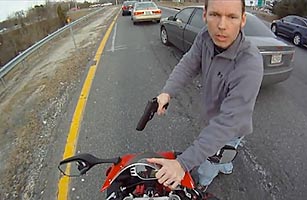Russ Brown Motorcycle Attorneys®: Video taping traffic stops.
You may remember the case of Anthony Graber, the Maryland motorcyclist charged with violating the state’s wiretapping statute for recording his traffic stop and posting the video on YouTube. It’s been said by quite a few other blogger’s several times over the last few months that these charges are based on a misreading of the law; minus a “reasonable expectation of privacy,” recording an oral communication does not violate the wiretapping statute.
As it turns out, the Maryland Attorney General agrees.
The Maryland Attorney General has released an opinion advising a state legislator that, contrary to the claims of Harford County State’s Attorney Joseph Cassilly, a traffic stop is probably not an instance where a police officer can claim a reasonable expectation of privacy.
The AG’s opinion provides a thorough survey of Maryland’s and other states’ decisions on the issue, giving three possible interpretations of the wiretap statute as applied to a citizen recording a traffic stop.
These days, it’s not hard to see why police are wary of being filmed. In 1991, the Los Angeles Police Department (LAPD) beating of Rodney King was captured on video by a private citizen. It was shown repeatedly on television and caused a national uproar.
More recently, a New York Police Department officer was thrown off the force — and convicted of filing a false report — because of a video of his actions at a bicycle rally in Times Square. The officer can plainly be seen going up to a man on a bike and shoving him to the ground. The officer claimed the cyclist was trying to collide with him, and in the past, it might have been hard to disprove the police account. But this time there was an amateur video of the encounter — which quickly became an Internet sensation, viewed more than 3 million times on YouTube alone.
In the Graber case, the trooper also apparently had reason to want to keep his actions off the Internet. He cut Graber off in an unmarked vehicle, approached Graber in plain clothes and yelled while brandishing a gun before identifying himself as a trooper.
Last year, Sharron Tasha Ford was arrested in Florida for videotaping an encounter between the police and her son on a public sidewalk. She was never prosecuted, but in June, the American Civil Liberties Union (ACLU) of Florida sued the city of Boynton Beach on her behalf, claiming false arrest and violation of her First Amendment rights.
Since 1975 Russ Brown has been fighting to protect the rights of bikers… Call 1-800-4-BIKERS to speak with a lawyer today!












